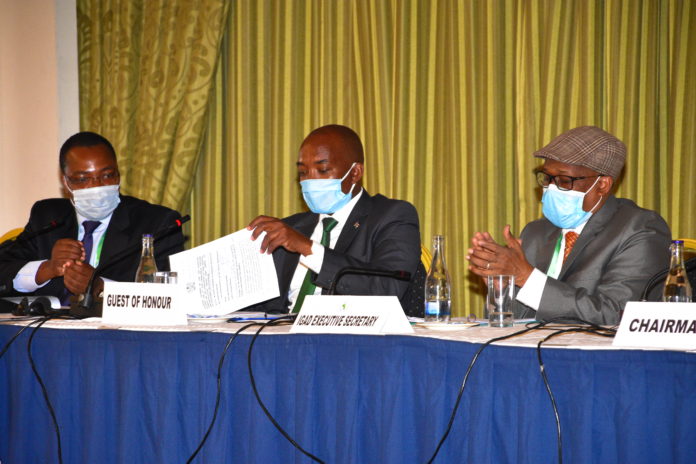Nairobi, Kenya November 6, 2020 — Officials from the eight-nation Intergovernmental Authority on Development (IGAD) converged in the Kenyan capital, Nairobi to assess the development of the regional infrastructure master plan that is due in December 2020.
The IGAD region has shown to make strides in the development of new regional infrastructure projects such as the Ethiopia-Kenya Power Interconnector and the Great Ethiopian Renaissance Dam.
However, leaders argue that underdeveloped infrastructure remains a major constraint in the IGAD region with no regional master plan of priority projects built on the consensus of its member states.
The Intergovernmental Authority on Development Regional Infrastructure Master Plan (IRIMP) which began in May 2018 seeks to establish regional infrastructure development for the region to enhance regional physical and economic integration, and in the long run promote trade, movement of goods and persons, and poverty reduction amongst its Member States.
IGAD To Work Closely With Civil Society
Elsadig Abdalla, IGAD Director expressed his delight in the program, affirming commitment to working with the Civil Society and NGOs in the IRIMP project.
“Previously we have been criticized as being too governmental,” Alsadiq told the conference through a speech he read on behalf of the IGAD Executive Secretary, Dr. Workneh Gebeyahu.
The IRIMP comes in to address this, and solve the problem of inadequate and poor regional infrastructure networks, connectivity, and efficiency.
“In this regional study, we have involved all our stakeholders, especially the NGOs because they are the real owners of our interventions and are the ones who have direct connection with our people at the grassroots in our region,” Elsadiq told Ubuntu Times at an interview.
The development of IRIMP is being financed through the support from the African Development Bank (AfDB) with the overarching objective to create an open, unified, regional economic space for private operators – a single market open to competitive entry and well-integrated into the global economy.
Its components will include a network of efficient infrastructure services; transport, energy, and communications.
Patrick Kanyimbo, the AfDB regional integration coordinator, assured the member states of the bank’s support.
“We are excited to be part of this master plan as we believe it will lead to greater investment floors in the region and we hope it also results in increased trade and economic activities among the member states,” Kanyimbo told the conference.
Banking On Africa’s Youth Bulge
Amb Lemoshira, Director at Kenya’s Ministry of Foreign Affairs told the conference that the African continent consists of an informed and technologically-savvy youth bulge, hence the need to put in place the appropriate infrastructure for them to be able to practice the tech skills acquired.
“AfCFTA is a game-changer, we are going to set the pace for our future in three ways. That of our capacity to ease movement, absorb new technologies and optimizing Africa’s youth dividend and potential,” said Amb. Moi Lemoshira.
The master plan constitutes one of the region’s high regional integration priority pillars which we leaders have been looking for since the first revitalization of IGAD in 1996.
Guided with two current initiatives, which are the African plan and the continental development agenda for 2063, IGAD regional infrastructure master plan has been drawn and tailored to fit with continental scenarios for development.
In 2018, IGAD contracted IPE Global Limited in association with Africon Universal Consulting to undertake a comprehensive 18-month study at a cost of $ 3.6 million.

